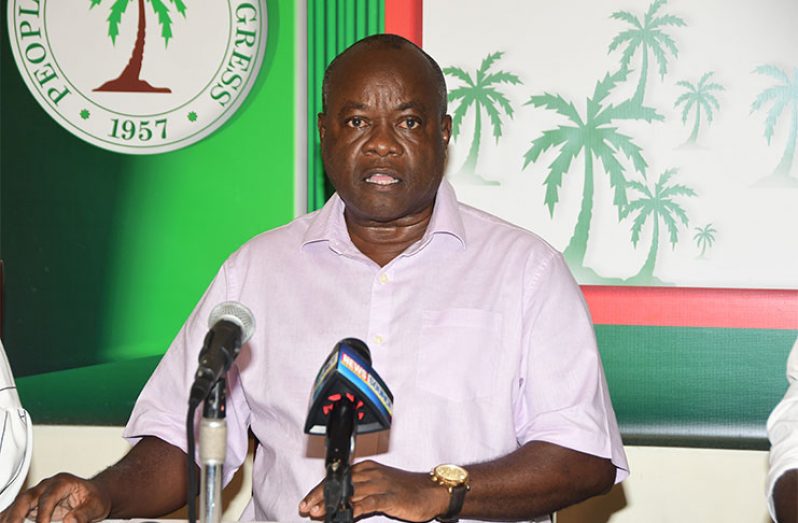CITING the drafting of the National Youth Policy, the ending of extra judicial killing of youths, the increase of scholarships and all-round improvement of the public education system, the People’s National Congress Reform (PNC/R) says that it is very much pleased with the trajectory of many youth-focused programmes implemented by the APNU+AFC government.
PNC/R executive member, Aubrey Norton, said that since the APNU+AFC coalition government took over in 2015, much has been put in place to reverse the adversities faced by youths all across the country under the rule of the People’s Progressive Party Civic (PPP/C)
“The government designed policies, programmes and projects that have restored hope. A mere four years ago, the youth were hopeless, they lived in fear of the police even if they were law abiding, the school dropout rate was very high, the illiteracy and innumeracy rate was extremely high, there was little or no training available to them,” Norton said as he read from the party’s weekly press statement.
“Under the PPP, Guyana’s youth were forced into enjoying the crumbs that fell from the drug lords’ tables. Serious crime was the order of the day, people committed crimes while the Guyana Police Force lacked the capacity to bring criminals to justice and our youth were living in a country in which the rich and powerful aligned to the criminal state, did as they pleased, making Guyana a lawless and dangerous place. Our youth existed in a state of hopelessness.”
Norton emphasised that one of biggest areas that government has invested in to address issues faced by youths, is in the education system, and has seen much favourable results.
Earlier this week, the Ministry of Education (MoE), in declaring the results of the 2019 Caribbean Secondary Examination Certificate (CSEC) and Caribbean Advanced Proficiency Examination (CAPE), noted that Guyana recorded pass rates of 77 per cent and 93 per cent, respectively.
The CSEC pass rate represented an over 10 per cent increase since 2014, when the pass rate was 60.21 per cent. Guyana earlier this year also saw marked improvements at the National Grade Six Assessment (NGSA), where for the first time in six years, public schools returned to producing the best performing students at the exam, which tested students in the areas of Mathematics, English, Science and Social Studies.
Results from the assessment showed that there was across the board improvements in Mathematics, which was recorded in all 11 educational districts in the country. This was a result of robust programmes that were developed to focus on this subject area.
In 2016, President David Granger mandated an Emergency Math Intervention Programme in grade schools. Though the pass rate in 2019 was 42 per cent it marked a significant 28.15 per cent increase since 2016 when the pass percentage stood at 13.85 per cent.
“The APNU+AFC government continues to invest heavily in the education sector since, and as President Granger stated “young people will succeed only if the performance of the public education is improved”. We have seen marked improvement of students at the CXC and generally throughout the system,” Norton pointed out.
He pointed out that interventions are not only focused on students in school but also on giving school drop outs a second opportunity.
“For many youths who dropped out of school or failed to obtain the required number of subjects to work or pursue higher education, there has been the establishment of free night schools. The PNC/R wants to assure all Guyanese, especially our youth, when the APNU+AFC returns to power, the night schools will be increased across the country to ensure all youths have access to a second chance at obtaining the education they need to enjoy the good life,” Norton said.
He further pointed out that the considerations go beyond academics, with much focus also placed on promoting vocational education opportunities and leadership skills as well.
“APNU+AFC recognises that our youth is a human resource to develop, and not all youths are academically inclined and that there is need for other forms of training. Programmes such as the Patient Care Programme enabled young people to enter the health sector and develop themselves into professional healthcare workers,” Norton noted
“The government has and will continue to develop programmes to give school dropouts a second chance. The PNC/R is convinced that this is the one way we can develop these youths who had no hope under the PPP. We are restoring dignity in labour and training the youth so that we shift them away from the PPP induced culture of getting rich quick at all means, and ensuring that our youth live law-abiding productive lives, in a society based on law and order.”
Aside from educating youths, government has also put in place measures to give resources to youths to support their ideas and plans. In 2019 the government set aside $70M for the Youth Innovation Project (YIP), which is in addition to the $50M that was plugged into the initiative in 2018.
YIP offers grants to entrepreneurial youths aware of issues, challenges or difficulties in their community and wish to propose solutions.
“Thousands of young people have been employed and continue to benefit from the Youth Innovation Project in the form of start-up financing and financial literacy and small business management training. More than one thousand young people have been able to start their own business,” Norton related.
“We are aware that there is need to rectify the youth leadership deficit that existed under the previous government. The government therefore trained thousands of young people in leadership, and provided them with the tools they need to work among their peers and place their communities on the course to sustainable development.”


.jpg)











